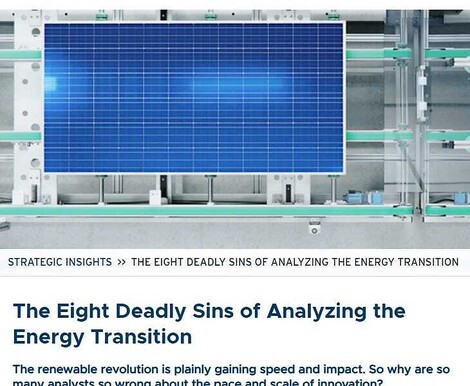sharing is caring
ist wirklich so!
Vielen Dank fürs Teilen!
Kluge Köpfe filtern für dich relevante Beiträge aus dem Netz.
Entdecke handverlesene Artikel, Videos und Audios zu deinen Themen.

Kurator'in für: Volk und Wirtschaft Fundstücke Klima und Wandel
Ich schreibe „Cleantech Ing.“, einen Newsletter, über Technologien, die wir brauchen werden, um die Klimakrise zu lösen.
Über die Energiewende wird viel geschimpft, diskutiert, polemisiert – oft mit Missgunst, aber immer wieder entdecke ich neugierige, wohlwollende Menschen, die trotzdem verbreiteten Missverständnissen aufsitzen.
Manchmal ist einer dieser Menschen auch Picker bei Forum.eu und heißt Rico Grimm.
Ich habe aus dem Text, den ich heute empfehle, viel mitgenommen. Darin zeigen zwei Analysten, welche großen abstrakten Fehler Menschen immer wieder machen, wenn sie sich über die technisch-ökonomische Revolution beugen, die die Energiewende ist. Es sind insgesamt acht Fehler. Ich greife mir zwei heraus. Der Fehler, den auch ich aufgesessen bin:
The error is to focus on stocks, which are the installed base that has accumulated over time.
Wer wissen will, wie es um den Verkehrssektor steht, sollte sich nicht die totalen Zahlen von E-Autos anschauen, sondern, wie sich deren Verkäufe entwickeln.
Und noch ein zweites Missverständnis, sehr weitverbreitet auch in der Klimabewegung selbst:
The error is to look only under the climate streetlight, thinking the sole driver of the energy transition is halting climate change.
Klimaschutz ist nicht mehr der einzige Grund für die Energiewende. Erneuerbare Energien sind billiger und effizienter als fossile. Das machen sich immer mehr Akteure zunutze, die eigentlich nichts mit Klimaschutz am Hut haben. Wie sonst ist zu erklären, dass zum Beispiel Texas zur Erneuerbaren-Hochburg in den USA wird?

Quelle: Sam Butler-Sloss EN renewablerevolution.substack.com
Bleib immer informiert! Hier gibt's den Kanal Volk und Wirtschaft als Newsletter.
Einfach die Hörempfehlungen unserer Kurator'innen als Feed in deinem Podcatcher abonnieren. Fertig ist das Ohrenglück!


Öffne deinen Podcast Feed in AntennaPod:
Wenn alles geklappt hat,
kannst du das Fenster schließen.

Öffne deinen Podcast Feed in Apple Podcasts:
Wenn alles geklappt hat,
kannst du das Fenster schließen.

Öffne deinen Podcast Feed in Downcast:
Wenn alles geklappt hat,
kannst du das Fenster schließen.

Öffne deinen Podcast Feed in Instacast:
Wenn alles geklappt hat,
kannst du das Fenster schließen.

Öffne deinen Podcast Feed in Apple Podcasts:
Wenn alles geklappt hat,
kannst du das Fenster schließen.

Öffne deinen Podcast Feed in Podgrasp:
Wenn alles geklappt hat,
kannst du das Fenster schließen.

Bitte kopiere die URL und füge sie in deine
Podcast- oder RSS-APP ein.
Wenn du fertig bist,
kannst du das Fenster schließen.

Öffne deinen Podcast Feed in gpodder.net:
Wenn alles geklappt hat,
kannst du das Fenster schließen.

Öffne deinen Podcast Feed in Pocket Casts:
Wenn alles geklappt hat,
kannst du das Fenster schließen.
Ich möchte eigentlich nur folgenden Kommentar zitieren, der unter dem Artikel zu finden ist:
"This is a sad example of incoherent, poorly thought-out boosterism.
There isn't enough time in the day to take down all of the bad or irrelevant arguments presented, but I'll try:
1. Of course adoption of new technology is not linear. It may be that we are on a path toward economically viable renewable energy for general application. Even if this is true, it will take a great deal of time to complete the transition - it took nearly 300 years for coal to replace wood as a primary energy source in Britain. Arguing that adoption is nonlinear is a non sequitur if the claim is that renewables are on the brink of becoming the primary source. It's especially irrelevant if the claim (not made here but apparently treated as axiomatic by the governing class) is that we "must" have Net Zero emissions by 2030 (or 2035, or 2050, or any other date).
2. Lagging vs. leading indicators - it's useful to think of flows vs. stocks for energy sources. Not addressed is the viability of the "flows" of new renewable energy facilities. There seems to be an assumption that renewable installations will continue exponential growth, without acknowledging that this implies exponential increases of subsidies, which will be harder and harder for cash-strapped governments to maintain. If our post-2008 era of extremely low interest rates is over, renewables become even less viable economically.
3. Turning points can produce disruptive change, but they're only obvious in hindsight. Based on contemporary accounts, we've been decisively turning away from oil for the last 50 years. Some day, these claims will undoubtedly be true, but there's no good evidence they're true now. It's rather odd to claim that the energy transition will result in both falling and higher prices for oil - did anyone read this article before publishing it?
4. "The largest areas of fossil fuel demand are the most vulnerable. Power, road transport, and low-temperature heat make up nearly 70 percent of fossil fuel demand, and they already face the threat of successful and rapidly growing renewable technologies." It's worth pointing out that this threat is driven entirely by legal and regulatory requirements, backed by subsidies for renewables. Once the cost of the subsidies and the implications of the carbon-free system become clear, I doubt they will continue to be politically viable, even to the avowedly progressive parties in the western world.
5. Of course the world isn't static - it's in constant motion. That doesn't mean that the changes are predictable, or that they will advance to meet the preferences of people who share the ecological aesthetic of the Rocky Mountain Institute. The claim that solar is the cheapest energy source in history, slipped in as if it were established fact, is a sly maneuver, but won't help when confronting the physics and economics.
6. It's true that climate change isn't the only motivation for pursuing renewable energy. Some of it is aesthetic, and pleases people who don't have to make it work. Some of it is rent-seeking, where elites steer public resources to favored causes. The rest of the claims in this section are evocatively poetic, but very short on claims of fact.
7. Increasing energy efficiency is a good thing, but totally irrelevant to whether or not we are in an "energy transition". If you accept the prior assumptions, …"
Danke Rico - hab ich gebraucht grade.
Noch ein Teaser gefällig?
"Der Fehler ... besteht darin zu glauben, der einzige Treiber der Energiewende sei die Eindämmung des Klimawandels.
Das Klima war der Funke und bleibt ein konstanter und mächtiger Katalysator, aber die Kräfte der Veränderung sind tiefer und die Motivationen vielfältiger. Im Mittelpunkt der Energiewende steht die Abkehr von einem teuren, ineffizienten, volatilen, knappen, auf fossilen Rohstoffen basierenden System hin zu billigeren, saubereren, schlankeren Technologien, deren Kosten ständig sinken und die überall verfügbar sind. Wir bewegen uns von schweren, feurigen Molekülen zu leichten, gehorsamen Elektronen; von der Jagd auf fossile Brennstoffe zur Nutzung der Sonne. Die Revolution der erneuerbaren Energien setzt den langen Bogen der Energiegeschichte fort: Effizienz schlägt Verschwendung, Technologien schlagen Rohstoffe und Ökonomie schlägt Ideologie."